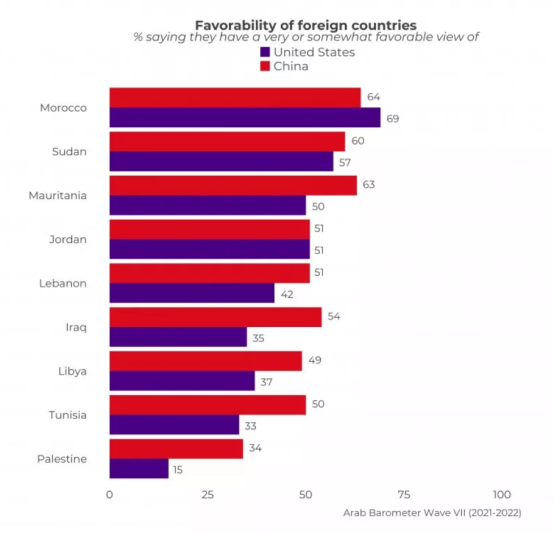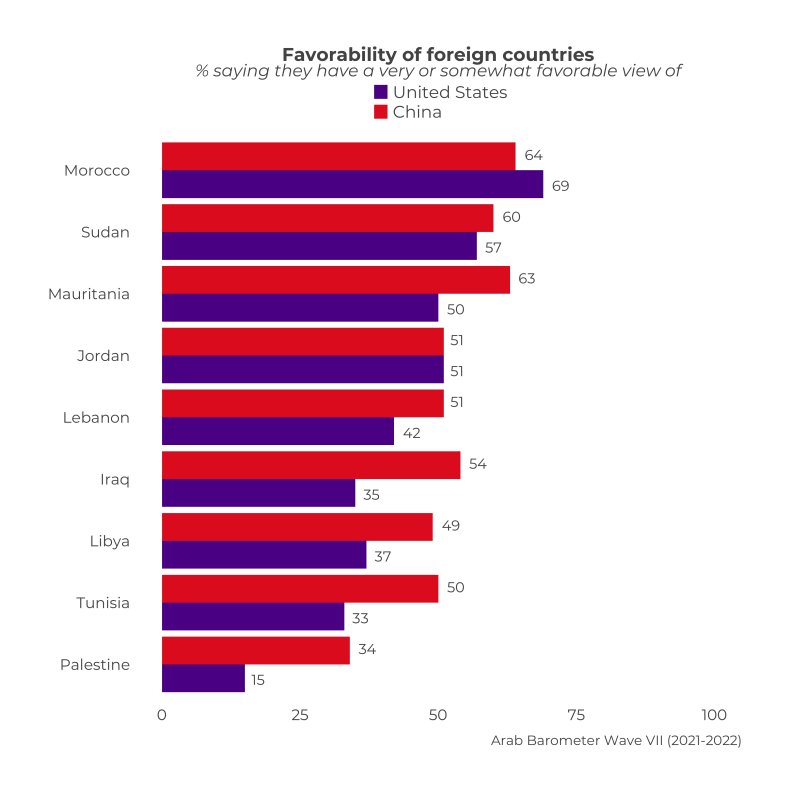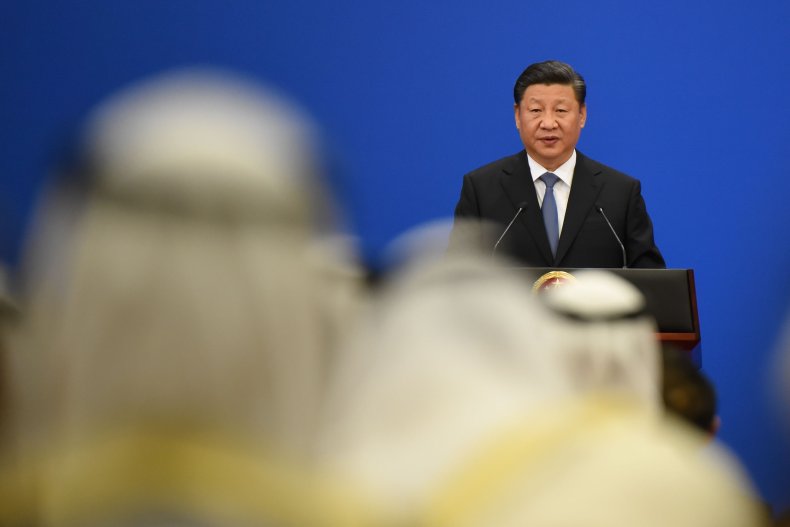风萧萧_Frank
以文会友美媒:中国成阿拉伯世界最受欢迎国 在七国中领先于美国
【环球网报道 记者 张晓雅】“独家报道:尽管面临挑战,中国仍超越美国成为阿拉伯世界最受欢迎的国家”,美国《新闻周刊》当地时间10日以此为题报道称,其独家并提前获得的一项新民意调查结果显示,中国在至少7个阿拉伯国家民众中的好感度领先于美国。
China Tops U,S, as favorate Power Among Arabs Despite Challenges

《新闻周刊》独家报道:尽管面临挑战,中国仍超越美国成为阿拉伯世界最受欢迎的国家
报道说,美国普林斯顿大学无党派研究网络“阿拉伯晴雨表”自2006年以来一直在中东和北非进行民意调查,上述民调基于2021年10月至2022年4月期间在伊拉克、约旦、黎巴嫩、利比亚、毛里塔尼亚、摩洛哥、巴勒斯坦、突尼斯和苏丹对近2.3万名受访者进行调查,每个国家误差幅度约为2个百分点。
此项调查结果很快就会出现在“阿拉伯晴雨表”的网站上。根据《新闻周刊》提前获得的调查结果显示,只有在对美国和中国的评价都高的摩洛哥,受访者对美国的好感度(69%)略高于中国(64%),在约旦,受访者对中美的好感度不相上下(分别为51%左右),在黎巴嫩,受访者对中国的好感度(51%),比美国(42%)比美国高9个百分点。
提完上述少部分情况,报道继续说,在大多数其他受访国家里,对美国持正面看法的人都在少数,除了在苏丹,受访者对美国的好感度(57%)仅落后中国(60%)3个百分点;在毛里塔尼亚,中国(63%)则领先美国(50%)13个百分点。
此外,在突尼斯,中国(50%)领先美国(33%)17个百分点;在利比亚,对中国持好感度的受访者(49%)也比美国(37%)高出12个百分点;对巴勒斯坦受访者的调查结果显示,对中美两国的好感度在所有受访国的民众中最低,不过中国(34%)仍遥遥领先于美国(15%)。

《新闻周刊》曝出“阿拉伯晴雨表”调查结果
基于上述数据,报道说,“阿拉伯晴雨表”主任兼联合首席研究员迈克尔·罗宾斯与《新闻周刊》讨论了研究结果。
“中国带着诸多优势介入,几乎没有地区纠葛缠身,而且明确表示希望在该地区保持政治中立”,罗宾斯说,不仅如此,通过“一带一路”倡议,中国还增加了整个地区的经济参与水平。” “考虑到许多其他国家(对该地区)的直接干预,”他补充说,中国“更中立的政治立场可能会让该地区许多普通公民感到耳目一新。”
但曝出上述数据的同时,《新闻周刊》的部分说辞却也有些变调,它声称 “北京雄心壮志的外联活动在这个被华盛顿留下艰难遗产的地区找到了沃土”,并表示中国想要赢得阿拉伯世界人心的努力也遇到了挑战,原因是人们对中国所能提供的东西存在一定程度的怀疑。
2022年3月7日,国务委员兼外交部长王毅在两会记者会上阐述中方在解决中东热点问题方面发挥的作用。王毅表示,长期以来,安全与发展一直是困扰中东国家的两大难题。作为中东国家的战略伙伴,中国始终奉行“两个支持”,那就是支持中东国家团结协作解决地区安全问题,支持中东人民独立自主探索自身发展道路。王毅说,过去一年多来,中方先后提出关于实现中东安全稳定五点倡议、政治解决叙利亚问题四点主张、落实巴以“两国方案”三点思路,旨在推动对话解决热点问题、实现地区安全和共同安全。同时,中国同中东各国携手抗击疫情,推进疫苗生产、药物研发合作。加快中国与海湾国家自贸区建设,启动中国与伊朗全面合作协议,为促进中东发展提供了积极助力。
王毅还表示,中国在中东发挥的始终是建设性作用,我们从不谋取什么地缘私利,更无意去填补所谓权力真空。过去数十年,正是因为域外大国竞相干预中东事务,给中东地区和中东人民造成了一次又一次伤害。21世纪的今天,这种局面不应再继续下去。应当把维护中东安全与发展的权力彻底交到中东人民手中,支持中东国家以团结谋和平,以自强谋稳定,以合作谋发展,真正实现中东地区的长久和平与繁荣。
Exclusive: China Tops U.S. as Favorite Power Among Arabs Despite Challenges
BY TOM O'CONNOR
Anew poll obtained exclusively in advance by Newsweek reveals that China leads the United States in popularity among the people of at least seven Arab countries, as Beijing's ambitious outreach continues to find fertile ground in a region in which Washington has left behind a difficult legacy.
But challenges have emerged for the Chinese effort to win hearts and minds in the Arab World, as there is some degree of skepticism toward what Beijing has to offer.
Arab Barometer, a nonpartisan research network based at Princeton University that has been conducting high-level polling in the Middle East and North Africa since 2006, conducted the survey based on nearly 23,000 interviews across Iraq, Jordan, Lebanon, Libya, Mauritania, Morocco, the Palestinian territories, Tunisia and Sudan between October 2021 and April 2022, with a margin of error of about 2 points in each country.
The results, soon to be featured on Arab Barometer's website, showed that only in Morocco, which had the highest opinions of both countries, did respondents have a slightly more favorable view of the U.S. (69%) than China (64%), and in Jordan, they were tied (51% each). China achieved the same figure (51%) in Lebanon, but the U.S. (42%) was nine points below.
Those who had positive perceptions of the U.S. were in the minority in most other countries, with the exception of Sudan, where the U.S. (57%) was only three points behind China (60%), and in Mauritania, where the U.S. scored exactly half (50%), while China had a 13-point lead at 63%.
Double-digit leads were also scored by China (50%) against the U.S. (33%) in Tunisia and in Libya, where just under half had a favorable view of China (49%) and even fewer had a favorable view of the U.S. (37%).
Palestinians had the lowest opinions of both countries, though China at 34% achieved its largest lead in all countries against the U.S., which came in at just 15%.

Michael Robbins, director and co-principal investigator at Arab Barometer, discussed the findings of the study with Newsweek.
"China has recently reemerged as a power in the MENA[Middle East and North Africa] region," Robbins said. "China stepped in with a number of advantages, with few regional entanglements and a stated desire to remain apolitical in the region. Through its Belt and Road Initiative (BRI), it has increased levels of economic engagement across the region."
"Given the direct meddling of many other powers," he added, "its more neutral political stance may have appeared refreshing to many ordinary citizens across the region."
Chinese officials have frequently criticized U.S. interventions across the Middle East and Afghanistan, and have taken a far more neutral stance on geopolitical issues in Beijing's extensive business dealings with Iranian, Israeli, Palestinian and Saudi firms, among others.
With the exception of Israel, Jordan and the Palestinian territories, every Middle Eastern and North African country, including the other seven surveyed by Arab Barometer, has signed on to the BRI.
On Friday, Chinese Foreign Ministry spokesperson Hua Chunying accused the U.S. and its allies of having "made up various pretexts such as so-called possession of weapons of mass destruction to picture other countries as threats — and sometimes even without any valid reason— to blatantly launch military strikes and even unleash wars on sovereign countries."
In her comments, which came in response to U.S. accusations regarding People's Liberation Army drills surrounding the disputed island of Taiwan, she specifically called out "humanitarian tragedies" in countries such as Iraq, Libya, Syria and Afghanistan, the first target of the U.S.-led "War on Terror" that has spanned the Middle East and its peripheries in Asia and Africa for more than two decades.
"How many innocent civilians have been wounded and killed?" Hua asked reporters rhetorically. "How many families have been torn apart and lost? Have the U.S. and other NATO countries involved done any soul-searching on these tragedies? Have they felt even a tinge of guilt for the serious ramifications and catastrophes they caused? Have they ever made an apology to the victims in those countries? And have they ever given them any compensation?"
During the next press briefing held Monday, her colleague, Wang Wenbin, lodged a similar accusation.
"For quite some time, in the name of democracy and human rights, the U.S. has wantonly interfered in the internal affairs of developing countries and launched military interventions and aggression against them," Wang said. "That poses the biggest threat to regional and international security."
Though these arguments may resound for many in the Arab World, Robbins pointed out that opinions of China have declined in recent years, and he attributed this to a shift in how Chinese economic overtures have come to be viewed.
"China is not a truly neutral party," Robbins said. "Its terms of economic engagement are ones that tend to heavily favor Beijing over local populations as many, including those living in Sri Lanka and Pakistan among others, have come to realize recently. It appears that those in MENA are starting to come to a similar conclusion — Chinese economic engagement is not all it is cracked up to be."
Other results from the latest Arab Barometer polling showed that those in all nine countries were more likely to view China as providing the lowest-quality and cheapest projects, as opposed to Germany, Turkey, the United Kingdom, the U.S. or "other" countries.
When it came to highest-quality construction, Germany won out in all nations except Mauritania, where the U.S. was the first choice. Across all nations, China was seen as the country that built projects at the lowest cost, with the U.S. and Germany at the other end of the spectrum with the most expensive. The U.S. was also chosen as the favorite to pay the best salary among respondents in the majority of countries.
Desires to build stronger economic relations with Beijing and Washington were mixed. More respondents in Tunisia, Iraq, Jordan, Libya and the Palestinian territories expressed enthusiasm for tightening economic ties with China, while more in Sudan, Morocco and Lebanon sought to strengthen economic cooperation with the U.S., all with single-digit differences except in Sudan, in which 10% more backed better economic relations with the U.S. than with China.
As for whether either power was viewed as a "critical economic threat," however, respondents in all countries were more likely to point the finger at the U.S. than China.

The study might not reflect the full scope of China's influence in the Arab World, as much of Beijing's regional investments has been geared toward wealthier nations, such as those located in the Arabian Peninsula.
Robbins said that these nations have a far stronger say when it came to the conditions of striking deals with China.
"There is a major difference between Chinese engagement with the Gulf countries and the rest of the region," Robbins said. "The Gulf countries are not approaching from the same position of relative weakness. All are wealthy countries that could potentially benefit from Chinese investment and economic engagement, but are not dependent upon it as a development strategy. Losing Chinese investment may hurt them to a degree, but they have other options given their status as high-income countries."
This may mitigate concerns over dealing with China in countries such as Saudi Arabia and the United Arab Emirates, or even Egypt, located on the bridge of North Africa, the Levant and the Arabian Peninsula. China has expanded its dealings with these countries in recent years.
Robbins argues that by comparison "most other countries in the region are at a far weaker position vis-a-vis China," saying that "China can more easily dictate terms of engagement, which often leads to deals that are more in China's interest than those of the country itself."
Also potentially affecting regional perceptions were shifts within the U.S. itself.
Robbins said that President Joe Biden, while his popularity was "moderate" in the region, was still "far more widely favored than former President Trump in the countries that we have surveyed."
During his Middle East trip that brought him to Israel, the West Bank and Saudi Arabia last month, Biden proclaimed that the U.S. "will not walk away and leave a vacuum to be filled by China, Russia or Iran."
At the same time, he has shared his predecessor's stated aim to end "forever wars" in the region. And Robbins said the drawdown of U.S. military involvement may be having a positive impact on perceptions of Washington.
"We do have some evidence that there would likely be support for a decreased role for the U.S. in the region," Robbins said. "When we asked about views of the U.S. military withdrawal from Afghanistan, a majority in all countries surveyed were in favor, including 80% in Palestine and Jordan."
"These results suggest that MENA publics favor a decreased security role for the U.S.," he added.




